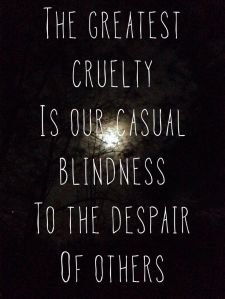Years ago I heard a very disturbing story about a young woman who had a bilateral mastectomy and ended up in the psychiatric ward of her local hospital.
Through various contacts I was able to arrange to speak face to face with Gemma* and verify the pertinent facts.

She had found some suspicious lumps in both her breasts and despite being told that these were ‘only calcification’, she did some research on the Internet† and discovered that calcification can indeed turn into cancer. Because she was a single mother with two young girls (aged 9 and 11) to raise, she wasn’t prepared to run the risk of them possibly losing their mum before they were grown-up so she decided to have both her breasts removed.
The surgery was performed by a breast surgeon and she was relieved to think that she needn’t live with the spectre of cancer hanging over her. However, she had considerable post-operative pain that the surgeon dismissed as histrionics and she was sent home from hospital with no discharge plan in place.
No one took the time to find out what support she might have at home and she was told to take Panadol if the pain was severe.
Gemma found it impossible to sit up again after she lay down and spent her first night at home in agony, eventually wetting the bed because she was unable to get up to go to the toilet. Her daughters’ bedroom was at the back of the house and hers at the front, so they couldn’t hear her call for help. And realistically, what could these two children have done for their mother?
It’s tempting to ask why she didn’t speak up and explain her home situation but the responsibility rested with the hospital to ask the right questions. When faced with momentous circumstances many people don’t function in fully adult ways and this young woman needed someone to take the time to make sure that she had a support network in place.
Friends who had minded the children for the few days Gemma was in hospital couldn’t keep them any longer because they were moving to a different State and her boyfriend was overseas at the time. There was no one else to look after them and because no one asked the right questions or told Gemma that services could be set up to get her little family safely through her recovery period, she felt she had no option except to go home and look after them herself.
She also wasn’t prepared for the overwhelming grief that she experienced when she finally plucked up the courage to look at her chest. When her boyfriend returned he didn’t understand that her constant crying and withdrawal were signs of depression. Gemma had suffered depression in the past; how could the surgeon or hospital not know this? Obviously she hadn’t told them, but why wasn’t she asked how she was coping or how she would manage when she went home?
Peter* had no experience with depression and had no clue how to treat her. His solution was to tell her to ‘get over it’, ‘be grateful she didn’t have cancer’ and ‘she had chosen to have her breasts removed’. Eventually he ended the relationship.
This was the final straw for Gemma and she took an overdose of sleeping pills. 
She left a note that her older daughter found, telling them to contact Peter because he would look after them. She also said where she was going so it seems clear that she didn’t really want to kill herself. Luckily Peter found her and took her to the hospital where she was admitted to the psychiatric ward.
Here she was pumped full of sedatives to keep her quiet, but refused pain medication despite still suffering since her surgery. Four days later she was finally seen by a psychiatrist who thought to ask her what had happened in her life recently.
Luckily this doctor realised that she needed counselling, not locking up, and arranged for the hospital Social Worker to sort out home care for her until she was fully recovered and appointments with a psychologist, as well as medication to help her function in the short term.
In my conversation with Gemma it was apparent that she was dealing with a high level of grief. Every cancer patient (or in her case, potential cancer patient) will experience a sense of loss to varying degrees. Their progress through this grief will depend on the support network that they have and the ability of professionals and family and friends to allow them to ‘tell their story’ as many times as they need to tell it, until they have come to terms with their new reality. This needs to be done without judgment or advice on how to ‘fix it’.
Gemma’s case was more extreme than most, but given the lack of any planning by the hospital regarding her post-surgery discharge and her personal circumstances, perhaps not really so surprising.
Thankfully these days it is unlikely that anyone would slip through the cracks to the same extent that Gemma did, as it is now generally recognised that duty of care doesn’t end with a patient’s discharge from hospital. However, I believe that there are still times when our over-stretched hospitals don’t follow their own protocols for discharging patients.
So if you know someone who is going through a traumatic time, please ask the question: ‘Are you okay?’ If the answer is yes but you doubt this is true, please advocate on behalf of your family member/friend to make sure that there is indeed a functioning support system in place before a patient is discharged from hospital or if they seem to be struggling down the track. Don’t just assume that because it happened a while ago (regardless of what ‘it’ was), that the person who went through the experience is okay now.
* Names changed
† I recommend that if you do consult Dr Google, always discuss your findings with your own medical advisers
© Jane Gillespie
http://janegillespie.com.au/counsellor.html
 celebrations there. More of this type of accommodation is essential for single women to live a connected life.
celebrations there. More of this type of accommodation is essential for single women to live a connected life.



